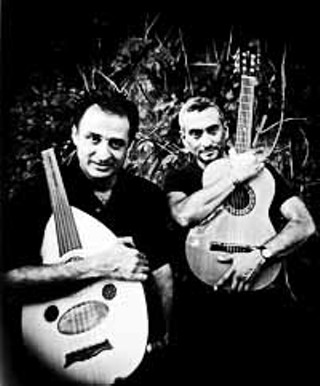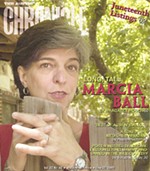God Willing
Kamran Hooshmand & Javier Palacios, Bringing Together Previously Disparate Cultures
By Belinda Acosta, Fri., April 13, 2001

People in this part of the globe know very little about Iran and the Middle East. The most likely touchstone for knowledge of Iran is the Iranian Hostage Crisis and the Iran-Contra Affair. Mexico suffers a similar image deficit. Common knowledge of Mexico and things Mexican are defined through a prism of vintage stereotypes and contemporary, commercial icons like the Taco Bell Chihuahua, J-Lo, and Ricky Martin -- none of which are Mexican.
Given these incongruous images, how does one explain the fact that two of the most talented musicians living in Austin, Iranian-born-and-raised Kamran Hooshmand, and Javier Palacios of Monterrey, Mexico, found each other in Austin, Texas, and began to make music? The answer is simple: fate.
Hooshmand and Palacios perform together as Ojalá, a Spanish word meaning "God grant" or "God willing." The word has roots in the Arabic word, "Inshallah," and most likely entered Spain and Persia (now modern-day Iran) during the Arab conquests. Like the origins of the word, the music on their first CD, also titled Ojalá, is a mesh of Spanish and Persian music. While that combination may sound absurd, history offers an explanation.
"I always knew there was a connection between the two cultures, because I could link them together musically," Hooshmand explains.
As a former graduate student in anthropology with an emphasis in ethnomusicology at UT, Hooshmand spent a great deal of time researching how and why the musical styles, from two distinct cultures, work so well together.
"When I did research on the connection, I found that the Middle Eastern influence in southern Spain was very strong," he says. "Then I found out that they used a lot of Persian musicians in Spain."
Fans of world music need not know musical history to appreciate the rumba, flamenco, and bolero styles commonly found in Persian popular music. All cultures have songs of love and longing, and Ojalá brims with songs of heated passion to wrenching cries of heartbreak. Traditional Spanish songs are given new breath with Persian musical touches, while Latin rhythms are layered over traditional Persian songs. The result is an inspired collection of songs, infused with the complexity, beauty, history, and heart of both nations.
Separated at Birth
The story of how these two musicians came to find each other is almost as quirky as meeting them in person. Each exudes a contrasting, yet complementary intensity. Palacios is naturally witty in his offhand way of blending English and Spanish, teen-boy slang, and expletives peppered in conversation to make a point. A snap of the fingers is as much a part of his diction as words. He says he's disorganized, but a better description would be spontaneous.
Hooshmand, on the other hand, is more serious. He chooses his words carefully, mapping out what he wants to say and leaving little room for confusion. Their styles and personalities may differ, but once you hear their music and see them together, the mix is obviously working.
The two began working together last year, but the duo initially got to know each other by attending each other's gigs. Palacios admired Hooshmand's solo work as well as his band, 1001 Nights. For his part, Hooshmand was a regular when Palacios' group, Centzontle, performed at South Congress eatery El Sol y la Luna. Both landed in Austin in the late Eighties, and their parallel paths are coincidental enough to sound made-up.
Hooshmand: I moved to Texas as a pre-med student. I was going to be a doctor.
Palacios: [Astonished] Me too!
Hooshmand: Really? I think it's a Third World phenomenon.
Palacios: I almost finished. I needed one year to graduate, and I quit to do music.
Hooshmand: Me too!
Palacios: Dude! Really?
Hooshmand: Absolutely!
Palacios: He's my twin! He's my evil twin!
Prior to arriving in Austin, their paths are remarkably similar, even as they are dissimilar. Neither of them took the roots music of their own countries very seriously, focusing instead on outside influences.

"Believe it or not, I didn't sing Mexican songs in Mexico," says Palacios.
While a medical student in Monterrey, Palacios was acting, singing, and touring the country doing political theater.
"All I was in love with was political music, Canto Nuevo stuff," he explains. "I used to think that 'folk' music wasn't for me. I knew how to sing it, and I loved it, but I thought, that's already been said already. When I came here, I discovered that you sing one Mexican song that's folk, and the people go crazy. So, I thought, okay, why not?"
Hooshmand's entry to music was slightly different. He always had an interest in music, and his family had an appreciation for music, but it was not seen as a viable career for a young man.
"My dad brought back records from the U.S. in the early Sixties, which included son, rumba, tango, jazz, and other great music from the Americas," he recalls. "I heard them all while growing up in Tehran."
With this as his genesis, Hooshmand taught himself how to play 10 different instruments including the oud (lute), saz, darabukkah, and other instruments unusual to Western audiences. His instrument of choice was his lips.
"I used to play soundtracks to movies and famous television shows on my lips," he chuckles, "and my classmates had to guess what it was. Finally, my parents were convinced that I needed an instrument to express myself, and bought me my first electronic keyboard when I was a teenager."
A guitar followed at 16, and as he developed his innate talent for taking up instruments, he also developed a love for Latin music.
"During the Fifties, Sixties, and Seventies, as Latin American music became internationalized, it influenced Iranian pop music," he says.
Finding his way to Texas as pre-med, then an anthropology student at Southwest Texas, Hooshmand began driving to Austin to attend rehearsals of the Andean and Brazilian ensembles. He couldn't participate since he wasn't a UT student, but eventually he transferred to UT for his Master's degree in Middle Eastern Studies. It was during this time that the first Middle Eastern Ensemble at UT was formed.
"I got in, and I was so happy," he enthuses. "That's when I really started focusing on Middle Eastern music, which is Arabic, Persian, and Turkish, and which later on, resulted in [his band] 1001 Nights."
Corazón Loco
It was one, crazy heart -- figuratively and literally -- that brought Hooshmand and Palacios together musically. "Corazón Loco" was a song Hooshmand performed and recorded on the first 1001 Nights CD, Salaam. The song had its roots in Persian popular music, and though Palacios didn't understand the lyrics, he was drawn to the song's rhythms, which Hooshmand had refashioned into a rumba flamenco.
"I heard that song, and I said, 'You know, dude, we need to do something. I can put [Spanish] words to that,'" recalls Palacios. "Let's just get together and do something with this."
That "something" evolved into a performance at Flipnotics, and later into what is now Ojalá. But the two musicians weren't eager to launch into the traditional gig cycle, doing performances for $30 a night. Instead, they agreed to direct their attention to putting together a CD.
If the intensity of Hooshmand and Palacios isn't apparent meeting them in person, it's surely evident on Ojalá. A good example is the song "Cucurucucú Paloma." A traditional Mexican ballad about a woman reincarnated as a dove who sings to her heartbroken lover, the song is ordinarily sung with a mariachi.
"I wanted to sing 'Cucurucucú Paloma' so badly, and Kamran said, 'No, it's not going to work,'" Palacios remembers. "I said, 'Look, dude, you just follow me on the damn lute. In the first minute, if it doesn't work, I'll stop and give up.' Well, we started the song and finished the whole thing and it was perfect. I was almost pooping my pants."
"Javier is the pusher," says Hooshmand. "Sometimes I get a little shy, and he pushes me into the water."
"After this, he's lost all his shyness," laughs Palacios. "It's a nice compliment, actually. Things that I admire in him, I don't have ..."
"And vice-versa," agrees Hooshmand.
Passport to the World
Now that they have a new CD on their hands, can locals expect to see Ojalá perform locally? Yes, but the duo has their sights set on a larger audience.
"We definitely want to market this internationally," says Hooshmand. "I'm on the Web a lot, and I hear a lot of different things. I think I have a feel for what's out there, what an international audience will like, and what the sensitivities are."
"This is just the beginning," stresses Palacios. "We've discovered that there's an incredible amount of, not just Mexican songs, but Venezuelan, Argentinean, you name it -- many, many songs that can be translated from the Spanish to the Persian and vice versa."
For the present, the duo plans on promoting Ojalá in person and on the Web, sharing with the world what they've shared all along musically, culturally, and spiritually. Perhaps world peace is too lofty a goal for one CD, but who's to put a limit on the potential of music? ![]()








